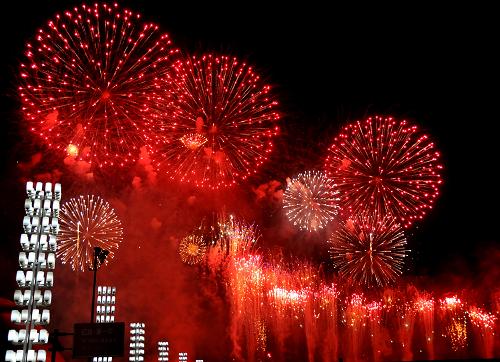

 |
|
[Photo/Xinhua] |
By Phuoc Nguyen, who won the first prize of the 2015 Just share it contest.
The baby wakes up crying. It’s 3 am. I’m not sure if the baby is hungry or she was awoken by the fireworks outside. Although it’s late, many people still brave the Beijing winter night to celebrate the start of Spring Festival, lighting and watching a wide variety of fireworks.
It’s my baby’s first Chinese New Year. Her first time hearing the constant cracking and seeing the flashing of fireworks that goes on all night and continues the next day. For me, this is my fourth. But this Chinese New Year means especially a lot to me and my new little family.
This year, I view Chinese New Year with fresh eyes. It’s often said that Chinese culture is a complex culture. If not deeply rooted and exposed to real Chinese life, a person, especially a foreigner, can’t fully understand or fathom the multi-faceted (and sometimes hidden) relationships and underpinnings. Chinese New Year offers a look into the different levels of knowing Chinese culture. For me, having a Chinese wife and newborn gives me another perspective in what Chinese New Year means.
On the very first level, Chinese New Year to most outsiders is simply an annual celebration. And the one thing promptly associated with the celebration is fireworks—lots and lots of fireworks. My first time experiencing Chinese New Year was the typical standing in the streets in complete awe of the massive amounts of fireworks on display in the night sky and on the streets. It was mind-boggling to listen to the cracking explosions continue for hours, even into the wee hours.
No place on Earth can compete with China’s use of fireworks. During the 2014 Chinese New Year celebration, it’s estimated that over 4,000 kilograms of fireworks were lit in Beijing alone. What’s more mind-boggling is that during Spring Festival the majority of Beijing’s residents leave for their hometowns, so the fireworks used are by a massively reduced population.
But on a deeper level, Chinese New Year (also called Spring Festival) is about homecoming. People who go to the bigger cities to work or attend classes travel home during the longest Chinese public holiday. Although the holiday is only officially about 3 days, people and businesses are off work for about a week if not longer. And the massive migration back home spans about 40 days. This time period is known as chunyun (春运).
Like most people in China, we wanted to go back to the family’s hometown. For us, it’s a matter of filial respect. For others, it’s a necessity on top of a cultural tradition. Many young people and parents are forced to go find work in a different city and only have this time to go back to visit family, even children left behind with relatives. So people endure crowded public transportation, some standing for more than 20 hours, just to get home for a few days. This means over 3 billion people are traveling during chunyun.
Fortunately, we will miss out on the bustling stations and jostling train this year because the baby is too young to travel. So unfortunately, the relatives back in the hometown will have to wait a year to meet the new member of the family. It’s a mixed blessing for us—happy for our little girl to join us but sad we can’t see the extended family.
In my years before being married and becoming a father, I never felt the importance for Chinese New Year as I do this time. Before, it was a time free of work and an opportunity to travel. Now I’m seeing this holiday in a different light. I’ve always known Spring Festival is traditionally family time, like Christmas is to Western countries. With a family of my own now, I feel the true pull for family gathering.
My wife’s grandfather isn’t getting any younger, so there won’t be many opportunities for our daughter to meet her great-grandfather. All my grandparents have passed away already. Yet the chance for these two generations to connect still exists on my wife’s side. We missed the chance this year but hope to grasp it next Spring Festival.
I never saw Chinese New Year in this way before—an opportunity to bridge generations. Having a deeper tie into Chinese culture, by way of marriage and with a child, I see and feel the greater value of family ties. Honestly, it’s hard to put into words. I can only express that I’m longing for next Chinese New Year to come so that our daughter can be embraced not only physically but in the hearts of her relatives who live far away and who have lived in very different times than she will experience. This is yet another deeper level of understanding Chinese New Year.
Media Support: | Chinadaily.com.cn | Ecns.cn | People's Daily Online | xinhua.net | China.org.cn | cntv.com | CRI.cn |
Link : | China Daily | Chinaculture.org |